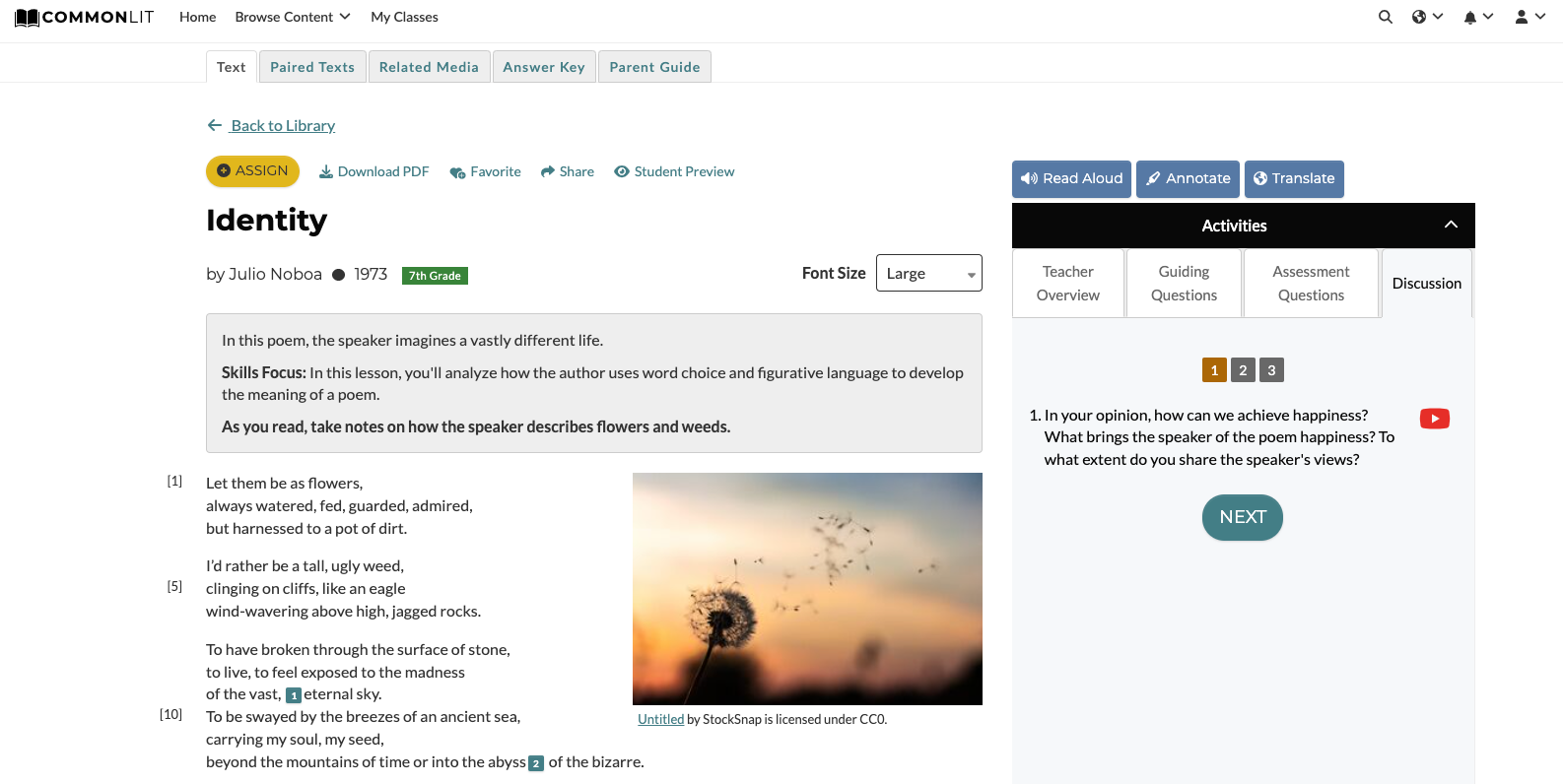 Secondary Classrooms
Meaningful Texts to Celebrate Hispanic Heritage Month
Secondary Classrooms
Meaningful Texts to Celebrate Hispanic Heritage Month
Celebrating students’ heritage and opening doors to other cultures can provide some of the most meaningful lessons in the classroom. Hispanic Heritage Month spans from September 15 through October 15 and provides students the opportunity to learn about the achievements and contributions of inspiring Hispanic Americans. Help build students’ writing skills and reading comprehension during Hispanic Heritage Month with CommonLit texts by Hispanic authors.
“The No-Guitar Blues” by Gary Soto (6th Grade)
Gary Soto is an award-winning poet, novelist, and memoirist, whose writing is informed by his Chicano Heritage. In this story, he writes about a young boy named Fausto, who wants to become a musician. Fausto comes up with a plan to earn enough money to buy a guitar, but he must decide if it is worth telling a lie in the process.
As students read, have them take notes on the impact of Fausto’s actions.
“Names/Nombres” by Julia Alvarez (6th Grade)
Julia Alvarez is a Dominican-American poet whose work focuses on her experiences as a Dominican in the United States. In this essay, Alvarez discusses the various names she has been given over the years.
As students read, have them take notes on how the author reacts to the different pronunciations of her name.
“Volar” by Judith Ortiz Cofer (7th Grade)
Judith Ortiz Cofer was a Puerto Rican-American author of short stories, poetry, and young adult fiction. In this essay, Cofer shares her memories and her childhood desire to fly.
As students read, have them take notes on how the characters in the passage view flying and how their perspectives relate to the larger theme.
“Identity” by Julio Noboa (7th Grade)
Writer Julio Noboa, who grew up in the Bronx, wrote this poem when he was in eighth grade. In this poem, the speaker imagines a life of freedom under the “vast, eternal sky.”
After students read, have them analyze how the author uses word choice and figurative language to develop the theme of the poem.

This poem by writer Julio Noboa provides a great opportunity to analyze word choice and figurative language.
“Abuelito Who” by Sandra Cisneros (8th Grade)
This meaningful poem is by Sandra Cisneros, whose writing frequently draws on her experiences as the only daughter in a family of six brothers and her family’s constant migration between Mexico and the United States. In this poem, the speaker describes their aging grandfather.
As your students read, have them take notes on how the author uses repetition to emphasize how aging affects their grandfather.
“Huevos Estrellados” by Vanessa Bernice De La Cruz (9th Grade)
This short story about family is set in a diner where the protagonist is eating breakfast with her father. They both order huevos estrellados, which the father cooked for his daughter when she was younger. The daughter begins reminiscing on meaningful moments she has had with her father over the years in a sort of out-of-body experience that will expose your students to magical realism.
As your students read, have them annotate the description of the girl and her relationship with her father as the story progresses.
“Sonnet XVII” by Pablo Neruda (10th Grade)
Pablo Neruda was the pen name and, later, legal name of Chilean poet-diplomat and politician Ricardo Eliécer Neftalí Reyes Basoalto. In this poem, the speaker describes their love for their partner as limitless and unique, and reminds readers to treasure relationships and live in the moment.
As students read, have them annotate examples of juxtaposition and how that emphasizes the theme that love is limitless.
“A Very Old Man with Enormous Wings” by Gabriel García Márquez (12th Grade)
Gabriel García Márquez is considered one of the most influential writers of the 20th century. In this short story, an old man with wings disturbs a quiet town after crashing into a family’s yard.
After students read, have them discuss what the old man symbolizes to different characters in the text.
Next Steps
Looking for more great texts to celebrate Hispanic Heritage Month with your students? Explore our Latinx Authors and History text set!
You can also sign up for one of our free Hispanic Heritage Month webinars, where we will give more relevant text recommendations and teach you how to assign lessons on CommonLit.


